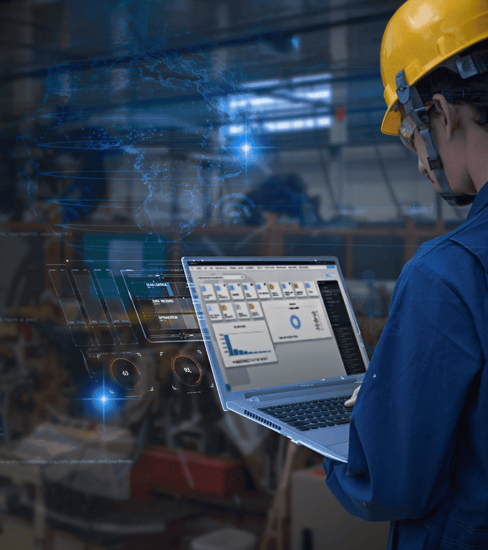It is becoming more and more apparent that businesses have discovered the importance of implementing enterprise resource planning (ERP) systems to automate their business processes. In particular, manufacturing units have moved faster towards automation due to difficulty staffing the shop floor during lockdowns.
Several recent surveys have gathered that 67% of manufacturers and distributors revealed that their ERP implementations were successful, while manufacturing units made up a whopping 47% of companies considering purchasing an ERP platform.
However, not all ERPs are made the same. Manufacturers, in particular, must look for specific modules to ensure a successful implementation.
So, what are the most critical ERP features to look for when choosing a manufacturing ERP?
Manufacturers need Industry 4.0-ready ERP solutions.
Manufacturing is a complex and diverse industry vertical, and it is challenging to generalize different kinds of manufacturing units. ERP modules that are necessary for a manufacturing unit depend on the type of process that needs to be automated. Regardless of the manufacturing process, we can quickly surmise that we are in the middle of what is being trumpeted as the Fourth Industrial Revolution, also known as Industry 4.0.
Industry 4.0 refers to the rapid adoption of the Internet of Things (IoT), artificial intelligence (AI), Machine Learning, and advanced robotics in automation.
For manufacturers, when IoT functionality is integrated into their ERP software, production processes are linked across the board, from inventory and warehousing to the shopfloor and distribution channels, accelerating workflows and saving on time, resources, and costs. IoT enables manufacturers to access greater amounts of data to power inventory management, product development, and customer service.
Thus, any ERP product a manufacturing unit decides to implement should be Industry 4.0-ready.
Here are the 8 most essential ERP modules for manufacturers:
1. Inventory Management
Inventory management at a manufacturing unit is complex and requires a lot of data-driven insight. A regular ERP may alert you when stock needs replenishment or if raw materials are abundant. However, a manufacturing-dedicated inventory management module ensures that it takes various rules and regulations related to specific raw materials into account.
For example, an intelligent AI-enabled inventory management tool recognizes when certain raw materials do not meet quality standards and helps you make the right decision at the right time. It enables you to comply with governmental protocols without interrupting the manufacturing process.
2. Quality Control and Assurance
Once manufactured, products need to go through quality checks and assessments. Even during the manufacturing process, various quality control and assurance (QC/QA) functionalities help you avert defective products being shipped to the market.
An intelligent QC/QA module enables you to automate all your QC processes and tests so that each product’s QA test can be tracked down to its serial number. Test procedures and standards can be easily defined and set so that you always have top-notch products in the end.
3. Manufacturing Execution System
A Manufacturing Execution System (MES) helps track manufacturing data in real time so that managers can track and monitor work-in-process. A good manufacturing ERP will consist of an Industry 4.0-ready MES that receives data from robots, IoT sensors, employee movement, and other sources.
It helps managers to track operations and ensure high-quality production. Smart MES systems seamlessly read RFID and bar codes to collect data while manufacturing processes are efficient and undisturbed.
4. Materials Requirement Planning
Manufacturing depends on the availability of raw materials and the required quantity. As a result, it is essential to automate planning, scheduling, and placing orders for raw materials based on various factors. These factors largely depend on insights from AI-enabled tools integrated within an MRP.
Smart features help manufacturing units plan their activities, schedule deliveries of raw materials and purchase stock when inventory needs replenishment.
5. Multi-Division Planning
Many manufacturing organizations employ multiple divisions spread across different locations. While smaller units may have two or three divisions, larger ones may have many more. Multi-Division Planning is an essential ERP module for manufacturing units as it simplifies the process of managing production at different divisions.
It can be easily customized to support repetitive, discrete, and hybrid forms of manufacturing. In other words, regardless of how many divisions or distribution centers you may have, all processes will be seamlessly streamlined and automated to cohesively function and a macro manufacturing ecosystem.
6. Product Data Management
Keeping track of product-related data can be challenging, especially when vast resources are at stake. A PDM is a dedicated module to capture and manage your product-related data that can be used during manufacturing. For instance, PDM insights help manufacturers to implement practical cost accounting, foresee logistical issues, and drive sales orders without affecting the bottom line.
7. ECO Management & Revision Control
Manufacturing is not just about the activities within your factory but also about complying with rules and regulations set forth by governmental agencies. For instance, manufacturing units must comply with energy consumption management (ECO management) to retain licenses and permits.
As a result, a dedicated ECO management module is necessary for manufacturing units to keep track of safety issues and government regulations and ensure a sustainable manufacturing process.
8. Lot Tracking and Serial Traceability
While traditional ERP systems often include built-in modules to help you track products by serial numbers, things get a little complex when working in a highly regulated industry. If the facility manufactures what the government deems to be controlled products, there will be strict regulations related to product tracking traceability.
A dedicated Serial and Lot traceability ensures automated and reliable product traceability management at every stage of product development until it is shipped to its destination.
Choose a manufacturing-specific ERP.
Choosing an ERP is a complex and drawn-out process. The right ERP system for a manufacturing business is ultimately a system that will address the unique business needs of every specific manufacturing facility.
You want an ERP that seamlessly combines your operational business processes automates your workflows, and enhances your overall performance, productivity, and efficiency. While some may think that this is a “tall order,” this is what an ERP is meticulously designed and developed to do. With a suitable ERP in place, any manufacturer can work smarter, more efficiently, and towards expanding the business and growing the bottom line.


